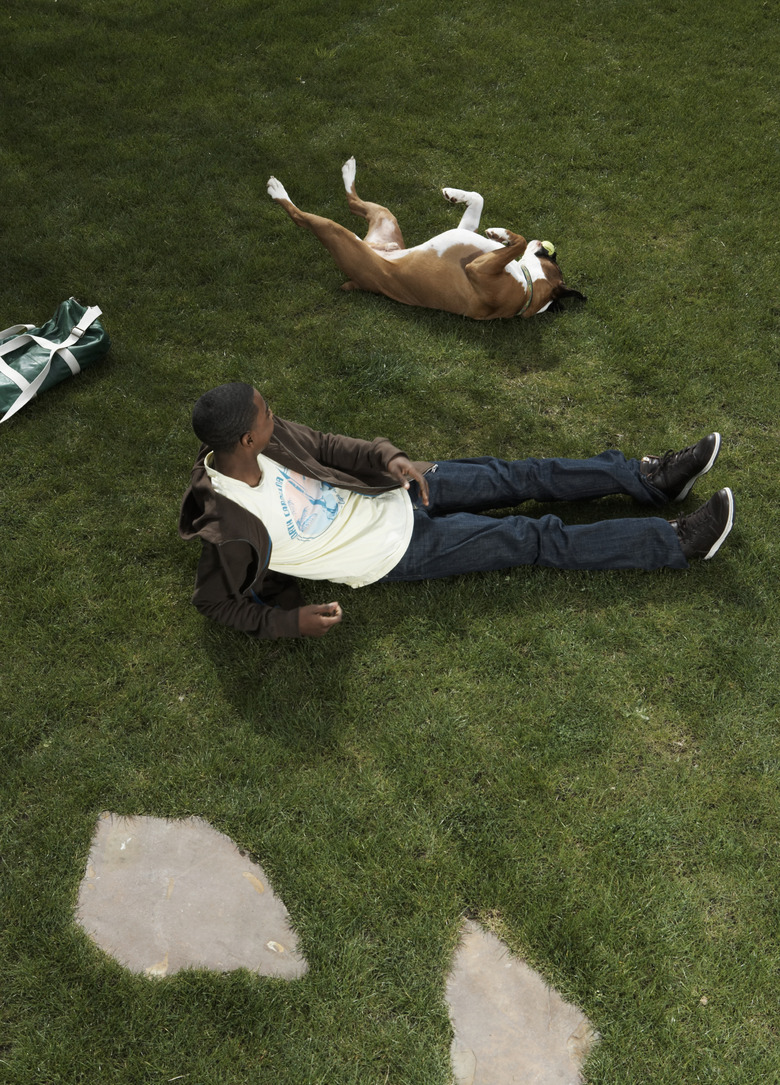Is Preen Dangerous To Dogs?
Keeping your lawn beautiful isn't always easy, especially if you are a busy mom who barely has time to turn on the sprinklers, let alone pull weeds. Chemicals offer the promise of quick control of weeds and invasive plants. However many pesticides are dangerous for dogs, not to mention yourself and other two-legged members of your family. The Preen brand of herbicides includes toxic and organic products.
Preen Information and Uses
Step 1
The Preen brand, manufactured by Lebanon Seaboard Corporation, includes post emergent and pre-emergent herbicides available in liquid or granular form. Preen products control a wide array of grasses and weeds including the annuals chickweed (Stellaria media) and crabgrass (Digitaria sanguinalis), and the perennial white clover (Trifolium repens), which grows in U.S. Department of Agriculture plant hardiness zones 3 through 10. The active ingredients in Preen varies depending on the exact product used and includes glyphosate and trifluralin. They also offer an organic pre-emergent option containing the non-toxic corn gluten meal that they claim doesn't pose a threat to dogs or humans.
- Keeping your lawn beautiful isn't always easy, especially if you are a busy mom who barely has time to turn on the sprinklers, let alone pull weeds.
- The Preen brand, manufactured by Lebanon Seaboard Corporation, includes post emergent and pre-emergent herbicides available in liquid or granular form.
Glyphosate-Containing Preen Herbicides
Step 1
Glyphosate generally has a low toxicity, according to the National Pesticide Information Center website. It is the other ingredients, however, added to the herbicides that can raise its toxicity level. If your dog comes in contact with or ingest plants sprayed with a Preen herbicide before it has dried, it may become very ill. If the dog becomes lethargic, vomits, drools, loses its appetite or becomes lethargic, contact your veterinarian.
Trifluralin Preen Herbicides
Step 1
Preen herbicides containing trifluralin are generally used as a pre-emergence control of various broadleaf weeds. A dog that is exposed to this chemical through skin absorption, inhalation and ingestion can become seriously ill. According to the EPA website, dogs that were exposed to the chemical for an extended period developed an increase in liver weight, changes in blood and weight loss. Contact your veterinarian immediately if you suspect your dog has been exposed to trifluralin.
- Glyphosate generally has a low toxicity, according to the National Pesticide Information Center website.
- If your dog comes in contact with or ingest plants sprayed with a Preen herbicide before it has dried, it may become very ill.
Considerations and Precautions
Step 1
Keep your dog — as well as other pets and children — out of the area while applying Preen herbicides. Furthermore, keep them out of the area until the liquid herbicide has dried or the granular herbicide has settled. If you suspect your dog has come into contact with Preen herbicides, contact the veterinarian immediately. If possible, have the herbicide label handy when contacting the veterinarian. This will help answer possible questions your vet may have about the chemical your dog has ingested.
References
- Preen: Best Way to Get Rid of Weeds: Preventing or Killing?
- Preen: Preen Weed and Grass Killer
- National Pesticide Information Center: Glyphosate General Fact Sheet
- Calflora: Stellaria Media
- Missouri Botanical Garden: Trifolium Repens
- EPA: Trifluralin
- Preen: Preen Garden Weed Preventer
- Preen: Preen Organic Weed Preventer
